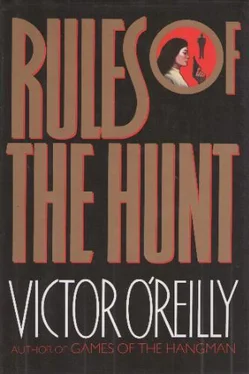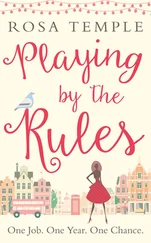Victor O'Reilly - Rules of The Hunt
Здесь есть возможность читать онлайн «Victor O'Reilly - Rules of The Hunt» весь текст электронной книги совершенно бесплатно (целиком полную версию без сокращений). В некоторых случаях можно слушать аудио, скачать через торрент в формате fb2 и присутствует краткое содержание. Жанр: Триллер, на английском языке. Описание произведения, (предисловие) а так же отзывы посетителей доступны на портале библиотеки ЛибКат.
- Название:Rules of The Hunt
- Автор:
- Жанр:
- Год:неизвестен
- ISBN:нет данных
- Рейтинг книги:4 / 5. Голосов: 1
-
Избранное:Добавить в избранное
- Отзывы:
-
Ваша оценка:
- 80
- 1
- 2
- 3
- 4
- 5
Rules of The Hunt: краткое содержание, описание и аннотация
Предлагаем к чтению аннотацию, описание, краткое содержание или предисловие (зависит от того, что написал сам автор книги «Rules of The Hunt»). Если вы не нашли необходимую информацию о книге — напишите в комментариях, мы постараемся отыскать её.
Rules of The Hunt — читать онлайн бесплатно полную книгу (весь текст) целиком
Ниже представлен текст книги, разбитый по страницам. Система сохранения места последней прочитанной страницы, позволяет с удобством читать онлайн бесплатно книгу «Rules of The Hunt», без необходимости каждый раз заново искать на чём Вы остановились. Поставьте закладку, и сможете в любой момент перейти на страницу, на которой закончили чтение.
Интервал:
Закладка:
In more ways than you know, if I have half a chance, thought Fitzduane. A great deal of effort by the Ranger Operations Research people had gone into preparing the presentation ax for Kei, but Fitzduane's own decapitation was not one of the results that Fitzduane had in mind. Instead, the objectives had been twofold: to intrigue Kei Namaka – and this had certainly succeeded – and to kill Kei, if an opportunity arose.
Under a thin coat of hardened steel, and lined with lead to resist X rays, in case Namaka security people were as routinely paranoid as most of their breed, the thick center of the double-edged ax head contained a pound of plastic explosive surrounded by five hundred miniature ball bearings. The device was totally sealed in and could not be detected by a chemical sniffer or even by removing the head from the shaft. The decorative wire binding the shaft made an excellent radio aerial. The effect when detonated would be roughly the same as two Claymore directional mines placed back-to-back.
Unfortunately, the radio detonator – Fitzduane's watch – had been removed from him and lay across the room with his other belongings, beside the two yakuza in the corner. Well, a British Army friend of his liked to say, plans had a habit of turning to ratshit. Like it or not, he was going to have to fight with a sword. Close to the end of the twentieth century, it seemed like a ridiculous weapon to have to use, but at close quarters it would kill just as surely as a firearm.
"Fitzduane- san," said Kei. "I do not wish to cause you unnecessary anguish by raising false hopes by not making your situation quite clear. You may be harboring thoughts of escaping from this dojo. Forget them. Your efforts would be futile. The door to the helicopter landing pad on the roof is locked, and outside is guarded by a special team of a dozen men loyal only to my clan. Frankly, your situation is hopeless. Your only recourse is to die with dignity. I am sure you will not disappoint me."
He bowed as he finished speaking. "The first, and I expect the last, man you will fight is Hitai- sensei. He is the instructor of the Insuji -gumi."
Fitzduane took his time replying. Hitai was a muscular yakuza of medium height with intelligent eyes and a peacock's-head tattoo showing at his throat. He looked to be in his mid-forties. His sword was still in its scabbard in his sash. The suffix sensei was not the best of news. This was not a thug with a blade, but a master with probably a quarter of a century's experience behind him. Experience with Japanese swords, though. European techniques were very different.
Fitzduane looked across to Kei and bowed back slightly. "Thank you for the morale-raising speech, Namaka- san," he said dryly. "I shall endeavor to meet my obligations in the appropriate way."
Another yakuza came forward and laid a rapier on the polished floor several yards in front of Fitzduane, then backed away hastily. Fitzduane moved forward almost casually, keeping his eye on Hitai, and dropped to one knee and picked it up. Hitai did not move. He just gazed impassively at this gaijin.
Fitzduane had learned not only to sword-fight from his father, but also something of the history of swordplay. It was Fitzduane Senior's belief that skill with a blade should be instinctive rather than consciously premeditated, so he used to talk to his young pupil while fighting, trying to both teach and distract. The result, after many years, was that Fitzduane, while fencing, fought almost entirely on instinct and by reflex, and before a major bout actually found it helpful to clear his mind and think of something other than the minutiae of tactics.
"The first recorded sword, as far as I know, Hugo," his father had said, "was an Egyptian weapon made of bronze from the nineteenth century B.C. called a khopesh, with a long grip and a sickle-shaped blade. Actually, it was more of a knife than a sword, but it was interesting metallurgically in that it was made from one piece.
"Around fifteen hundred B.C., longer bronze swords were produced, and these were narrow thrusting weapons up to three feet long and only half an inch wide. The thinking was right, but not the technology. Bronze is a soft metal and such a narrow length would bend, so eventually a shorter, leaf-shaped blade evolved."
Fitzduane, rapier in hand, slowly backed away from Hitai. The yakuza looked at Kei Namaka in surprise, then advanced toward the gaijin. Hitai's katana was still in its sheath.
"Slowly, around a thousand B.C., iron replaced bronze and the leaf shape became a little narrower and the short, broad-bladed weapon carried by the Roman legionaries, the Spanish sword, emerged. This was about two feet long and two inches wide, and it was state of the art at the time. It was designed primarily for thrusting. It was long enough to allow close-in work when carrying a shield, but no so long it bent or got in the way of your neighbor. It was worn on the right side for a quick draw unencumbered by the shield, and it was light, compact, and deadly. In contrast, the Gauls had long, slashing swords. Throughout the history of sword fighting, there has been a debate about whether the sword is primarily a thrusting or cutting weapon. Well, the Romans liked the point, and their empire lasted longer than most. They had a saying: Duas uncias in puncta mortalis est, which is worth remembering even today. ‘Two inches in the right spot is fatal.’ The thrust, in my opinion, expressed over two thousand years after the Romans came to the same conclusion, is still the most deadly technique for a sword."
The yakuza sensei was looking impatient. The gaijin had backed away slowly but continually, and he would soon be off the wooden floor and onto the tatami mats where visitors sat. Still, he could not retreat much longer. Two yakuza guards with slung Uzis and drawn katanas stood against the wall. They would soon prod this cowardly foreigner back into action.
There has been some mystery about what had happened during the abortive hit on Yasukini-dori outside the Fairmont and some talk about the gaijin 's fighting prowess. It was now clear that the gaijin had had nothing to do with his escape. The police must have intervened unexpectedly and it was as simple as that.
"The Romans were primarily infantry," Fitzduane's father had said. "After they lost high ground, cavalry in the form of Attila the Hun and the Goths, for example, became the dominant arm for a while, and swords became longer and more used for cutting. You needed a long sword if you were going to fight from a horse, and using the point if you are a horseman is near impossible. From a horse, you slash. The point only comes into play with a spear or lance, and even then it is largely limited to one kill. A pointed weapon sticks in its victim, and if you are on a horse, either you let go or else you get thrown."
Kei Namaka stepped forward, his face red with anger. "Fitzduanesan, what you are doing is not permissible. You must not retreat over the tatami mats. It is not proper. Fighting must be confined to the wooden floor. If you do not follow the rules, I shall order my men to cut you down. Frankly, you are a great disappointment."
Fitzduane stopped retreating, as if unsure what to do next. His shoulders were bent and he was carrying his sword low. There was a decided aura of defeat about him. He looked around, and the two yakuza wall guards brandished their weapons and made it clear that if he retreated any more, he would be killed. It was an imminent threat. The guards were only a couple of paces behind him. He was barely out of sword range.
He remembered his father again. "From the end of the Roman Empire for about the next thousand years, Western swords tended to be long, straight, wide-bladed, and heavy – and used primarily for slashing. This was the case whether horsemen or infantry were involved. Either way, a long heavy weapon was favored. Disciplined fighting in shielded, mutually protecting lines, Roman-style, was no longer practiced, and a long heavy weapon was deemed necessary to cut through armor and had the added advantage of keeping your enemy a reasonable distance away.
Читать дальшеИнтервал:
Закладка:
Похожие книги на «Rules of The Hunt»
Представляем Вашему вниманию похожие книги на «Rules of The Hunt» списком для выбора. Мы отобрали схожую по названию и смыслу литературу в надежде предоставить читателям больше вариантов отыскать новые, интересные, ещё непрочитанные произведения.
Обсуждение, отзывы о книге «Rules of The Hunt» и просто собственные мнения читателей. Оставьте ваши комментарии, напишите, что Вы думаете о произведении, его смысле или главных героях. Укажите что конкретно понравилось, а что нет, и почему Вы так считаете.




![Беар Гриллс - The Hunt [=The Devil's Sanctuary]](/books/428447/bear-grills-the-hunt-the-devil-s-sanctuary-thumb.webp)







